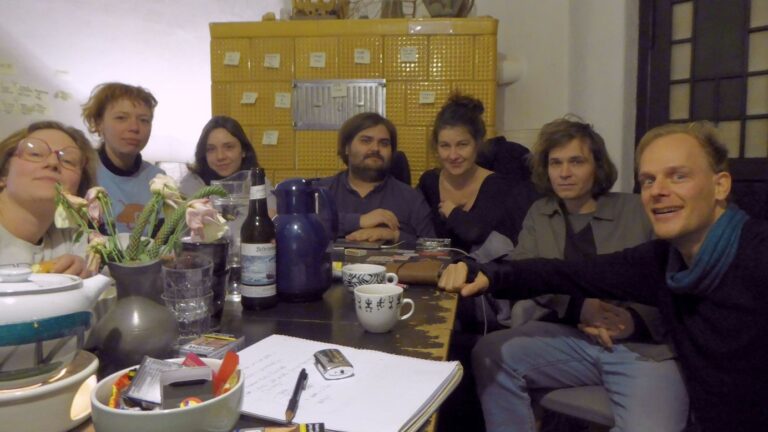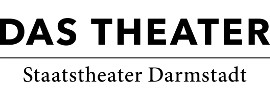
The almost complete Dritte Degeneration Ost in Stralsund (only Richard Grimm, the composer, is missing). From left to right: Romy Dins, Antonia Beeskow, Anne Bickert, Frithjof Gawenda, Frieda Gawenda, Laurenz Raschke, Mathias Baresel (Photo: Roland Quitt)
The new year begins for Dritte Generation Ost with an intensive working retreat at OPER OTZE AXT in Stralsund. Three of the eight come from there, the mother of the two Gawendas gives up her flat and it becomes a NOperas! flat share for a week.
One week of hard work. The daily schedule is rigorously organised. In the mornings, the team splits into smaller groups to work separately on individual areas – libretto, stage, music – and bring them back together in the evening in a plenary session. Additional funding organisations apart from feXm are also researched; the plan is for the project to continue to develop after the end of its three NOperas! phases and to be able to find additional performances, especially in the East.
During the last two working days, I join the feXm as dramaturge. Outside it’s freezing cold and the sky is bright blue, in the Gawenda flat there are overflowing ashtrays and thick clouds of tobacco.
A number of fundamental ideas have emerged during these days.
OPER OTZE AXT is roughly based on the real life story of Dieter “Otze” Ehrlich. It should remain inspired by his story. It should remain inspired by Ehrlich’s story without retelling it in detail and without laying claim to historical truth. Under no circumstances should it follow in the footsteps of the well-written personality musicals à la Lindenberg, Bowie or Abba.
Basic stages: Otze as a non-conformist, his rebellion, his conflict with state power and his secret pact with it when he becomes an informer for the Stasi. Otze then in the united Federal Republic of Germany: he slips into drugs, he kills his father.
Somewhere hidden in this story are questions about the relationship between the GDR and the new unified Germany. About the so-called “Wende” years, about the punk movement in East and West. And, of course, questions about the concept and idea of freedom. “Break what breaks you!” sang Ton, Steine, Scherben at the time. “Why don’t you break yourself!” was the title of a song by Dieter Ehrlich.
Although DDO has an equal number of male and female members, these two days are all about the male world. Of tough guys who get into heroic fights and get drunk, conspiratorially building their amplifiers somewhere to shout out their frustration in the closed-off world of the punk community.
Three protagonists emerge: Otze, his father and the collective of a many-faced and therefore all the more faceless conformist outside world – as character masks and voice leaders of the “Germany” system (first East, then East-West), individual figures can emerge from it, only to immediately fall back into it again. In any case, women do not seem to play a decisive role in Othete’s world. To be Oedipus, Otze has so far lacked Iocaste.
How does music theatre that refers to punk go together with classically trained opera voices and the instruments of a classical orchestra?
The key figure should be that of the father, conceived as a person who is always present but always silent. He is surrounded by the absence of sound. Silence is one of the most powerful means of musical expression at the moment of the general pause. Rebellion through noise and sound, on the other hand, characterises the son. While he cries out in vain for dialogue with his father, both are speechless in their own way. The idiom of the opera is then parodically set against them both as that of a West-Eastern petty bourgeoisie trapped in musical clichés.
It is above all this musical dramaturgy that has so far provided a more precise interpretation of the Otze parable. A play, therefore, about the speechlessness of an all-German society. A play also about the changed continuation of the parental conflict of 1968 into the 1980s.
While the revolt of the 1960s was as optimistic in its belief in the possibility of a better life as it was saturated with language and theory, after the collapse of all this hope, after the end of the Prague Spring in the East, the RAF and the Red Brigades in the West in the later Honecker era, which was also the era of Kohl, Reagan and Thatcher, all that remained was the language- and theory-less feeling of a last dance on the Titanic. In “contemporary music”, all binding systems disintegrated during this period. Pop is indulging in gloomy, plaintive songs. Punk cries out against the world without being able or even wanting to show a better one. Only the Gorbi shouts put an end to the general feeling of no future. But in Kohl’s blossoming landscape, the AfD is thriving today.





